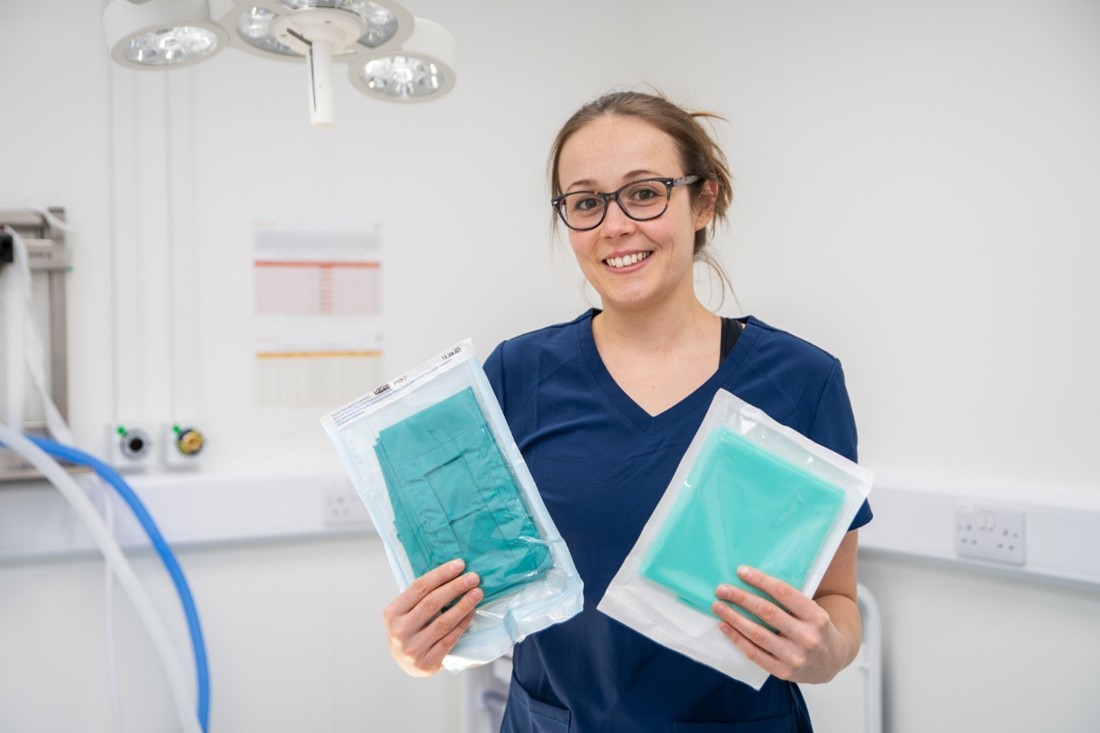
VetPartners are delighted to launch Project DRAPES! Our Sustainability and Clinical Board teams are collaborating for the first time on this unique study. Project DRAPES stands for Drapes in Routine Aseptic Procedures for Environmental Sustainability.
If your practice has talked to you about taking part in this study, you can find out more information here and see a copy of the consent form that your practice will give you here.
The large-scale study will look at post-operative infections and other wound complications following routine spaying and neutering of cats and dogs. Both reusable and disposable drapes are in regular use within practices for routine surgeries like neutering. Post operative infections only happen in the minority of surgeries, we want to see if either drape type makes a difference to how often we see them. If reusable textile drapes prove to perform the same as, or better than, single-use ones, practice teams will be able to choose reusable drapes with confidence, reducing waste and environmental impact without compromising patient care.
Nicole Dyer, Veterinary Surgeon at Ash Tree Vets, commented: “Many practitioners, including myself, are more and more interested in how we can reduce the environmental impact in practice. Whilst choosing reusable products may reduce the practice’s waste, there are evidence gaps as to whether this has any impact on our patient outcomes. I thought that as a large group of diverse practices we are in the perfect position to collect this data from our teams and potentially use that to answer some of these clinical questions. As vets we want to make sure we are making the best decisions for our patients. To do this we often look for evidence that support what we are doing day to day. We want to reduce environmental impact however not at the detriment to our patients.”
Jenny Stavisky, Clinical Research Manager at VetPartners, added “We have looked at all the research on drapes in veterinary and human medicine and there is no evidence one way or the other on which drape should be preferred for the least post-operative complications. We want to know how our practice teams who want to make more sustainable choices, and are committed to reducing their environmental footprint, can do that without having an impact on their patients.”
Hannah James, Head of Environment, Social and Governance at VetPartners, said: “We have a team with research experience and, as a large group, we have access to incredible data. If our studies show there is no difference between the two types of drape, our clinical teams can confidently make the choice and know they are using something more sustainable and that we have the evidence showing it’s not compromising patient outcomes. If one type of drape is compromising patient safety, we have a better evidence base record to protect patient safety and outcomes.”
This study has been funded by a PetSavers grant from the British Small Animal Veterinary Association (BSAVA) and has received ethical approval from the Royal College of Veterinary Surgeons (RCVS) Ethics Review Panel.
Members of the team involved in Project DRAPES include:
Nicole Dyer, Veterinary Surgeon, Ash Tree Vets
Hannah James, Head of Environment, Social and Governance, VetPartners
Jenny Stavisky (Clinical Research Manager); Kathryn Wareham (EBVM Manager); Hannah Doit (Patient Data Manager); Natalie Robinson (Clinical Data Manager), Rachel Dean (Director of Clinical Research and Excellence), Clinical Board Support Team, VetPartners
If you have any queries about this study, please contact Clinical.Board@vetpartners.co.uk

